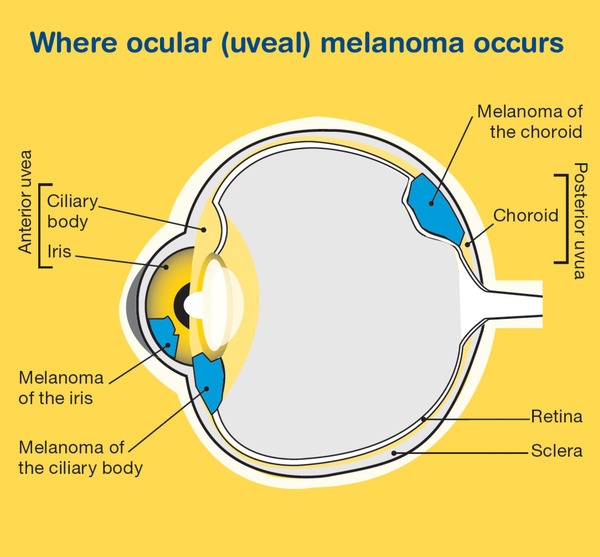Ocular melanoma, also known as uveal or eye melanoma, is a type of cancer that forms in the melanocytes—the cells in the body that produce pigment. Although melanomas are usually associated with skin cancer, they can also develop in the eye. Ocular melanoma is the most common type of eye cancer in adults, though it is relatively rare overall.

Symptoms of Ocular Melanoma
Ocular melanoma often goes unnoticed in its early stages as it tends not to cause any symptoms. However, as the disease progresses, patients may notice:
- Blurred vision or distorted vision or a sudden loss of vision.
- Flashes or floaters (spots or squiggles drifting in the field of vision).
- A visible dark spot on the iris.
- Change in the shape of the pupil.
- Loss of peripheral vision
Remember, these symptoms can also be linked to less severe eye conditions, so experiencing them doesn’t necessarily mean you have cancer. Nonetheless, it is always recommended to have any changes in your vision checked out by a professional.
Causes of Ocular Melanoma
While the exact cause of ocular melanoma is unknown, certain risk factors increase the likelihood of developing this disease. These include:
- Age: The risk of ocular melanoma increases as you age, with most people diagnosed being over 50 years old.
- Light eye colour. People with blue eyes or green eyes have a greater risk of melanoma of the eye.
- Being white. White people have a greater risk of eye melanoma than people of other races.
- Certain genetic mutations. Certain genes passed from parents to children may increase the risk of eye melanoma.
- Exposure to UV radiation or welding light.
- Certain inherited skin disorders. A condition called dysplastic nevus syndrome, which causes abnormal moles, may increase your risk of developing melanoma on your skin and in your eye.
Diagnosis of Ocular Melanoma
Early detection of ocular melanoma significantly improves the chances of successful treatment. Regular eye examinations are crucial, especially for those at increased risk. If your ophthalmologist suspects ocular melanoma, they may recommend specialized tests such as an ultrasound of the eye, angiography, optical coherence tomography, or a biopsy.
Treatments of Ocular Melanoma
The treatment strategy for ocular melanoma varies, depending on the size and location of the tumor, as well as the overall health of the patient. Here’s a brief overview of some common treatment options:
1. Observing Atypical naevus(mole):
For small melanomas, doctors may opt for a ‘watch-and-wait’ approach. Regular check-ups help monitor the tumour’s progression, with active treatment initiated only if the melanoma starts growing or causing symptoms.
2. Radiation Therapy:
Radiation therapy uses high-energy beams, like X-rays, to destroy cancer cells. This can be administered externally, or through a technique called brachytherapy, where radioactive seeds are placed near the tumor.
3. Laser Treatment:
Laser treatments, or thermotherapy, use a focused beam of light to heat and kill cancer cells. It’s often used in conjunction with radiation therapy to enhance effectiveness.
4. Photodynamic Therapy (PDT):
In PDT, a light-sensitive drug is injected into the bloodstream, which gets absorbed by cancer cells. When exposed to a specific type of light, the drug activates and kills the cancer cells.
5. Cold Treatments (Cryotherapy):
Cryotherapy uses extreme cold to freeze and kill cancer cells. It is typically used for small melanomas on the front part of the eye.
6. Surgery:
In some cases, surgery may be required to remove the tumor, or even the entire eye in severe cases. Eye removal, or enucleation, is usually a last resort when other treatments can’t control the tumor or preserve vision.
Complications of Ocular Melanoma
Ocular melanoma, though uncommon, can lead to serious complications. These can range from ocular issues like glaucoma and vision loss to more systemic problems when the cancer metastasizes.
- Increasing Pressure within the Eye (Glaucoma)
Ocular melanoma can lead to glaucoma, a condition characterized by increased pressure within the eye. The tumor can obstruct the normal fluid flow, causing a pressure build-up that, if unmanaged, can harm the optic nerve and result in vision loss.
- Vision Loss
Vision loss is another potential complication of ocular melanoma. Large eye melanomas often cause vision loss in the affected eye and can cause complications, such as retinal detachment, that also cause vision loss. Small eye melanomas can cause some vision loss if they occur in critical parts of the eye.
- Metastasis: Eye Melanoma that Spreads Beyond the Eye
The most serious complication is the potential for ocular melanoma to metastasize, or spread, to other parts of the body. When this happens, cancer can affect various systems and organs, most commonly the liver, leading to severe health implications and a more complex treatment scenario.
Conclusion
Ocular melanoma is a serious health concern, but with early detection and appropriate treatment, it can be managed effectively. Regular eye check-ups are essential, particularly if you fall into a high-risk group.
At Shekar Eye Hospital, we’re committed to providing the best care and support for our patients, helping you navigate through every stage from diagnosis to treatment. If you have any concerns about ocular melanoma, please don’t hesitate to contact us.








